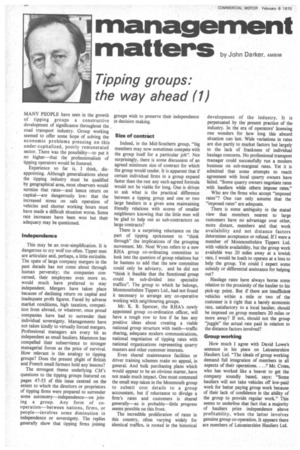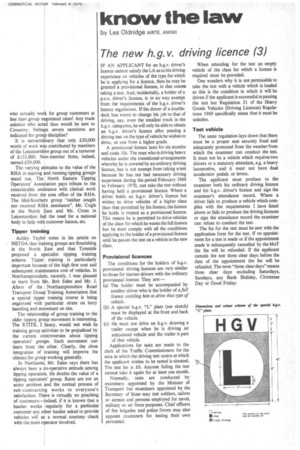management
Page 86

Page 87

If you've noticed an error in this article please click here to report it so we can fix it.
matters by John Darker, AMBIM
Tipping groups: the way ahead (1)
MANY PEOPLE have seen in the growth of tipping groups a constructive development of significance throughout the, road transport industry. Group working seemed to offer some hope of solving the economic problems pressing on this under-capitalized, poorly remunerated sector. There was the possibility—to put it no higher—that the professionalism of tipping operators would be fostered.
Experience so far is, I think, disappointing. Although generalizations about the tipping industry must be qualified by geographical area, most observers would surmise that rates—and hence return on capital—are dangerously low: that the increased stress on safe operation of vehicles and shorter working hours must have made a difficult situation worse. Some rate increases have been won but their adequacy may be questioned.
Independence This may be an over-simplification. It is dangerous to cry wolf too often. Tipper men are articulate and, perhaps, a little excitable. The spate of large company mergers in the past decade has not come about through human perversity; the companies concerned, their employees even more so, would much have preferred to stay independent. Mergers have taken place because of declining return on capital and inadequate profit figures. Faced by adverse market conditions, high taxation, competition from abroad, or whatever, once proud companies have had to surrender their individual sovereignty. Managements have not taken kindly to virtually forced mergers. Professional managers are every bit as independent as small hauliers. Mammon has compelled their subservience to stronger managerial forces as the price of survival. How relevant is this analogy to tipping groups? Does the present plight of British and French small farmers hold any lessons?
The strongest theme underlying CM'S questions to the tipping groups featured on pages 47-55 of this issue centred on the extent to which the directors or proprietors of tipping firms were prepared to surrender some autonomy—independence—on joining a group. Any form of cooperation—between nations, firms, or people—involves some diminution in independence or sovereignty. The replies generally show that tipping firms joining groups wish to preserve their independence in decision making.
Size of contract Indeed, in the Mid-Southern group, "big members may now sometimes compete with the group itself for a particular job". Not surprisingly, there is some discussion of an agreed minimum size of contract for which the group would tender. It is apparent that if certain individual firms in a group expand faster than the rest any such agreed formula would not be viable for long. One is driven to ask what is the practical difference between a tipping group and one or two large hauliers in a given area maintaining friendly relations with scores of smaller neighbours knowing that the little men will be glad to help out as sub-contractors on large contracts?
There is a surprising reluctance on the part of tipping spokesmen to "think through" the implications of the grouping movement. Mr. Noel Wynn refers to a new RHA group co-ordinating committee to look into the question of group relations but he hastens to add that the new committee could only be advisory, and he did not "think it feasible that the functional group could be sub-divided into specialist traffics". The group to which he belongs, Monmouthshire Tippers Ltd., had not found it necessary to arrange any co-operative working with neighbouring groups.
Mr. K. B. Spencer, the RHA's newly appointed group co-ordination officer, will have a tough row to hoe if he has any positive ideas about creating a viable national group structure with teeth—traffic sharing, adequate modern communications, national negotiation of tipping rates with national organizations representing quarry masters and other customer interests.
Even shared maintenance facilities or driver training schemes make no appeal, in general. And bulk purchasing plans which would appear to be an obvious starter, have not made much impact. One must commend the small step taken in the Monmouth group to submit cost details to a group accountant, but if reluctance to divulge a firm's rates and customers is shared generally—as is probable—little progress seems possible on this front.
The incredible proliferation of rates in this country, often varying widely for identical traffics, is rooted in the historical development of the industry. It is perpetuated by the present practice of the industry. In the era of operators' licensing one wonders for how long this absurd situation can last. Wide variations in rates are due partly to market factors but largely to the lack of frankness of individual haulage concerns. No professional transport manager could successfully run a modern business on sub-marginal rates. Yet it is admitted that some attempts to reach agreement with local quarry owners have • failed. "Some quarry owners negotiate rates with hauliers while others impose rates."
Who are the firms who accept "imposed rates"? One can only assume that the "imposed rates" are adequate.
There is some ambiguity in the stated view that members nearest to large customers have no advantage over other, more distant, members and that work availability and not distance factors determines acceptance or refusal. If I were a member of Monmouthshire Tippers Ltd. with vehicle availability, but the group work available was 20 miles away at a lowish rate, I would be loath to operate at a loss to help the group. Yet could I expect some subsidy or differential assistance for helping out?
Haulage rates have always borne some relation to the proximity of the haulier to his pick-up point. But if there are insufficient vehicles within a mile or two of the customer is it right that a barely economic rate, satisfactory to a local haulier, should be imposed on group members 20 miles or more away? If not, should not the group "juggle" the actual rate paid in relation to the distance factors involved?
Group working
How much I agree with David Lowe's sentence in his piece on Leicestershire Hauliers Ltd. "The ideals of group working demand full integration of members in all aspects of their operations. . . .1' Mr. Cross, who has worked like a beaver to get the company soundly based, says: "Some hauliers will not take vehicles off low-paid work for better paying group work because of their lack of confidence in the ability of the group to provide regular work." This seems to underline that fact that a majority of hauliers prize independence above profitability, when the latter involves genuine group co-operation. It appears there are members of Leicestershire Hauliers Ltd.
who actually work for group customers at less then group negotiated rates! Any trade unionist who acted thus would be sent to Coventry. Perhaps severe sanctions are indicated for group discipline?
It is extraordinary that only £20,000 worth of work was contributed by members of the Leicestershire group out of a turnover of £153,000. Non-member firms, indeed, earned £59,000.
The varying attitudes to the value of the RHA in starting and running tipping groups stand out. The North Eastern Tipping Operators' Association pays tribute to the considerable assistance with clerical work received from the area office of the RHA. The Mid-Southern group "neither sought nor received RHA assistance". Mr. Cogle in the North East and Mr. Cross in Leicestershire feel the need for a national body to help with customer liaison, etc.
Tipper training Ashley Taylor notes in his article on NETOA that training groups are flourishing in the North East and that Tyneside proposed a specialist tipping training scheme. Tipper training is particularly important because of the high first cost and subsequent maintenance cost of vehicles. In Northamptonshire, recently, I was pleased to learn from Mr. Bob Eales and Mr. J. Albon of the Northamptonshire Road Transport Group Training Association that a special tipper training course is being organized with particular stress on lorry handling and movement on site.
The relationship of group training to the older tipping group movement is interesting. The RTITB, I fancy, would not wish its training group activities to be prejudiced by the current controversies about tipping operators' groups. Each movement can learn from the other. Clearly, the close integration of training will improve the climate for group working generally.
In Northants, Mr. Eales says there has always been a co-operative attitude among tipping operators. He doubts the value of a tipping operators' group. Rates are not an acute problem and the normal process of sub-contracting works to everyone's satisfaction. There is virtually no poaching of customers—indeed, if it is known that a haulier works i regularly for a particular customer any other haulier asked to provide vehicles will as a normal courtesy check with the main operator involved.


















































































































































